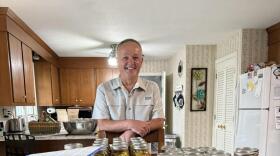The Temple Israel synagogue in Manchester gathered people on Sunday for a discussion on how the U.S. treats refugees and immigrants. The event had been planned for over a year, but it took on new meaning in light of the massacre last weekend at a Pittsburgh synagogue.
The shooter there, Robert Bowers, ranted online against the Central American migrant caravan and HIAS, a Jewish refugee aid group, before storming the Tree of Life synagogue. He called Jews the "enemy of white people."
Lisa Howe, a member of Temple Israel and one of the event organizers, says that when she heard news from Pittsburgh, she worried about hosting something that could make her synagogue a target.
"My first reaction was: 'Oh gosh, this event next week,'" she says. "Like, I don’t even want to have my kids in the building for this. On the other hand, then you kind of have to step back and say: 'No, you can’t do that. Then they win.'"
Temple Israel always has some security at big events, but now there is more - Manchester police and a state police presence.
Rabbi Jeremy Szczepanski opens the event with a reading from Chapter 19 of the Book of Leviticus:
"The foreigner who resides with you shall be as one of you, and you shall love them as you do yourself," he reads.
Rabbi Szczepanski says that the commandment to love the foreigner appears in the Torah 36 times, more than any other commandment.
"When God repeats something 36 times across five books of the Bible," he says, "We should pay attention."
For the next two hours, a scholar on refugee policy, an immigrant rights lawyer, and a Congolese immigrant who now lives in Manchester, talk about the immigrant crisis.

The scholar, Peter Rose, says it’s the right thing for Jews to stand with refugees, as they have been refugees themselves - many times.
Sue Gelinas, a congregant, agrees.
"Roosevelt turned away ships of Jews," she says. "Historically, we have not been that welcoming."
Ken Cohn, another congregant, says his ancestors' flight from Russia shapes how he sees immigrants.
"My relatives were persecuted by the pogroms," he says. "You know, people who just came into the village and killed them for being Jewish."
Cohn says until the Pittsburgh shooting, he had hoped that level of hatred and violence was a thing of the past.
"I used to say, 'Oh, we’re so thankful that in this day and age, we don’t have Nazi storm troopers coming to our front door and persecuting us for our religion.'" he says. "And then something like this happens and it’s a wake-up call that you can’t take anything for granted in this country."
For Cohn, the migrant caravan is a wake-up call too. He says that he's worried about refugees and immigrants being turned away at the U.S. border, and that we need major immigration reform.
But in a politically diverse congregation, people here have different ideas about what this reform would look like.
The president of Temple Israel, Steve Saulten, says that despite these differences, people here agree that the refugee crisis is a moral issue that spans political divides.
And when it comes to political differences, he's proud that the congregants engage with one another.
"We do a better job than our Congress is doing, as far as recognizing that you can disagree with someone without demonizing their position," he says.
Saulten says regardless of what happens in politics, and what threats are made against synagogues, Temple Israel plans to continue these conversations.









